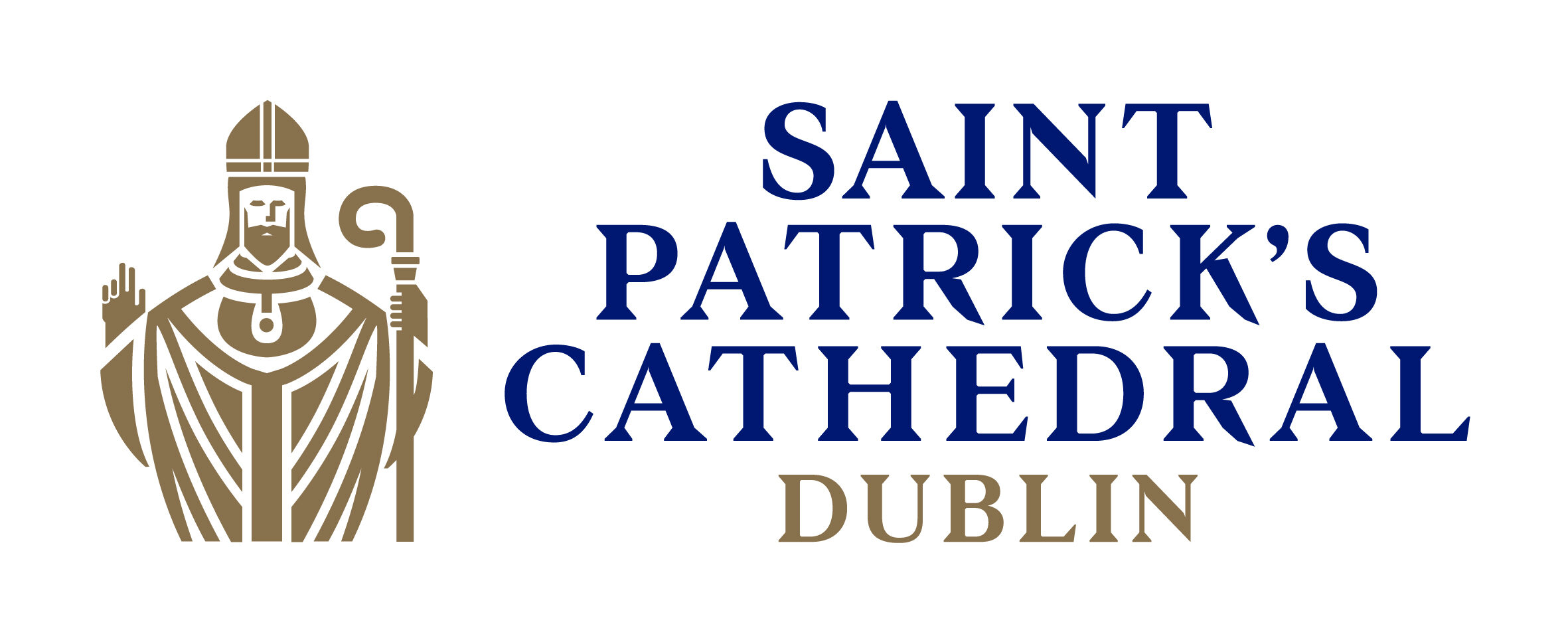Welcome
God has been worshipped in this place through the prayers and praises of countless generations. Worship lies at the heart of our life as Christians and we express our theology and belief through our liturgy. It is through these liturgical patterns of words and actions that we are formed and transformed.
Should you wish to translate this order of service into another language, please choose your language in the bottom right. There is a guest wireless network available within the Cathedral for those without a mobile data connection.
Please note that this service may be live streamed for our online congregation. By participating in this service, you acknowledge that you may be visible or audible. If you are uncomfortable about this possibility, please speak to a steward or verger, who will be able to advise further.
The ministry of Saint Patrick’s Cathedral is made possible entirely through the support of individuals like you. The donations which we receive from people all over the world support our worship and music tradition, education programmes, and community outreach work, as well as contributing towards the vast cost of maintaining this historic building. Should you wish to donate online, please tap the donate button.
What is Choral Matins?
Choral Matins at Saint Patrick’s Cathedral is the first service in our daily pattern of worship. As Christians, we know that God is with us at all times and in all places. Morning and evening are times set aside to pray. This morning prayer service brings us closer to God in three ways: through the singing of songs of praise, reading the Bible, and praying for ourselves and others.
Everyone present participates by being with God in worship, using silence and adoration, words and music. The ways in which we participate in this service may feel strange at first – as it invites us to use much more of ourselves than our voices. Each person has his or her individual part to offer. Some words are said by the ministers, some are sung by the choir; everyone is asked to pray them with heart and mind and strength.
You are invited to say the text in bold in English.
Please stand as the Minister, at the West End of the Cathedral, sings
Let us pray.
Please remain standing to sing the
Hymn
1. Ye servants of the Lord,
Each for your Master wait,
Observant of his heavenly word,
And watchful at his gate.
2. Let all your lamps be bright,
And trim the golden flame;
Gird up your loins as in his sight,
For aweful is his name.
3. Watch! ’tis your Lord’s command,
And while we speak, he’s near;
Mark the first signal of his hand,
And ready all appear.
4. O happy servant he,
In such a posture found!
He shall his Lord with rapture see,
And be with honour crowned.
5. Christ shall the banquet spread
With his own royal hand,
And raise that faithful servant’s head
Amidst the angelic band.
Philip Doddridge (1702–51); William Havergal (1793–1870)
The Minister welcomes the People, and introduces the
General Confession
Let us kneel, humbly to confess our sins unto almighty God:
Please kneel or sit, according to your custom
Almighty and most merciful Father; We have erred and strayed from thy ways like lost sheep. We have followed too much the devices and desires of our own hearts. We have offended against thy holy laws. We have left undone those things which we ought to have done; And we have done those things which we ought not to have done; And there is no health in us. But thou, O Lord, have mercy upon us, miserable offenders. Spare thou them, O God, which confess their faults. Restore thou them that are penitent; According to thy promises declared unto mankind in Christ Jesus our Lord. And grant, O most merciful Father, for his sake; That we may hereafter live a godly, righteous, and sober life, To the glory of thy holy Name. Amen.
The Priest pronounces the
Absolution
The People respond
Amen.
Please remain standing whilst the Minister and Choir sing the
Preces & Responses
O Lord, open thou our lips.
And our mouth shall show forth thy praise.
O God, make speed to save us.
O Lord, make haste to help us.
Glory be to the Father, and to the Son, and to the Holy Ghost;
As it was in the beginning, is now, and ever shall be, world without end. Amen.
Praise ye the Lord.
The Lord’s Name be praised.
Philip Radcliffe (1905–86)
Please sit as the Choir sings the
Psalm
PSALM 71 vv 1–5
In te, Domine, speravi.
In thee, O Lord, have I put my trust, let me never be put to confusion: but rid me and deliver me, in thy righteousness; incline thine ear unto me, and save me. Be thou my strong hold, whereunto I may alway resort: thou hast promised to help me, for thou art my house of defence and my castle. Deliver me, O my God, out of the hand of the ungodly: out of the hand of the unrighteous and cruel man. For thou, O Lord God, art the thing that I long for: thou art my hope, even from my youth. Through thee have I been holden up ever since I was born: thou art he that took me out of my mother’s womb; my praise shall be always of thee.
Please stand for
Glory be to the Father, and to the Son, and to the Holy Ghost; as it was in the beginning, is now, and ever shall be, world without end. Amen.
Please sit for the
First Lesson
Jeremiah 4: 11–12, 22–28
Please stand as the Choir sings
Te Deum
We praise thee, O God, we acknowledge thee to be the Lord. All the earth doth worship thee, the Father everlasting. To thee all Angels cry aloud the Heavens, and all the Powers therein, To thee Cherubim, and Seraphim continually do cry, Holy, Holy, Holy. Lord God of Sabaoth: Heaven and earth are full of the Majesty of thy glory. The glorious company of the apostles praise thee; the goodly fellowship of the Prophets praise thee. The noble army of Martyrs praise thee. The holy Church throughout all the world doth acknowledge thee; the Father of an infinite majesty, Thine honourable, true and only Son also the Holy Ghost the Comforter. Thou art the King of glory O Christ. Thou art the everlasting Son of the Father. When thou tookest upon thee to deliver man, thou didst not abhor the Virgin’s womb. When thou hadst overcome the sharpness of death: thou didst open the kingdom of heaven to all believers. Thou sittest at the right hand of God: in the glory of the Father. We believe that thou shalt come to be our judge. We therefore pray thee, help thy servants, whom thou hast redeemed with thy precious blood. Make them to be numbered with thy saints in glory everlasting. O Lord, save thy people and bless thine heritage: govern them and lift them up for ever. Day by day we magnify thee and we worship thy Name ever world without end. Vouchsafe, O Lord to keep us this day without sin. O Lord, have mercy upon us, have mercy upon us. O Lord, let thy mercy lighten upon us, as our trust is in thee. O Lord, in thee have I trusted: let me never be confounded.
Service in B flat; Charles Villiers Stanford (1852–1924)
Please sit for the
Second Lesson
Luke 15: 1–10
Please stand as the Choir sings
Jubilate
O be joyful in the Lord all ye lands: serve the Lord with gladness and come before his presence with a song. Be ye sure that the Lord he is God: it is he that hath made us and not we ourselves; we are his people, and the sheep of his pasture. O go your way into his gates with thanksgiving, and into his courts with praise: be thankful unto him, and speak good of his Name. For the Lord is gracious, his mercy is everlasting: and his truth endureth from generation to generation. Glory be to the Father, and to the Son: and to the Holy Ghost; As it was in the beginning, is now, and ever shall be, world without end. Amen.
Anglican chant; Edwin Monk (1819–1900)
Please remain standing to say the
Apostles’ Creed
I believe in God the Father Almighty, maker of heaven and earth: and in Jesus Christ his only Son our Lord: who was conceived by the Holy Ghost, born of the Virgin Mary: suffered under Pontius Pilate, was crucified, dead, and buried: He descended into hell; the third day he rose again from the dead: He ascended into heaven, and sitteth on the right hand of God the Father Almighty: from thence he shall come to judge the quick and the dead. I believe in the Holy Ghost: the holy catholic Church; the communion of saints: the forgiveness of sins: the resurrection of the body, and the life everlasting. Amen.
The Minister and Choir sing the
Suffrages & Responses
The Lord be with you.
And with thy spirit.
Let us pray.
Please kneel or sit, according to your custom
Lord, have mercy upon us.
Christ, have mercy upon us.
Lord, have mercy upon us.
Our Father, who art in heaven, Hallowed be thy Name. Thy kingdom come. Thy will be done on earth, as it is in heaven. Give us this day our daily bread. And forgive us our trespasses, as we forgive those who trespass against us. And lead us not into temptation, but deliver us from evil. Amen.
O Lord, shew thy mercy upon us.
And grant us thy salvation.
O Lord, guide and defend our rulers.
And mercifully hear us when we call upon thee.
Endue thy Ministers with righteousness.
And make thy chosen people joyful.
O Lord, save thy people.
And bless thine inheritance.
Give peace in our time, O Lord.
Because there is none other that fighteth for us, but only thou, O God.
O God, make clean our hearts within us.
And take not thy Holy Spirit from us.
The Minister intones the
Collect of the Day
Almighty and merciful God, of whose only gift it cometh that thy faithful people do unto thee true and laudable service; Grant, we beseech thee, that we may so faithfully serve thee in this life, that we fail not finally to attain thy heavenly promises; through the merits of Jesus Christ our Lord. Amen.
Collect for Peace
O God, who art the author of peace and lover of concord, in knowledge of whom standeth our eternal life, whose service is perfect freedom; Defend us thy humble servants in all assaults of our enemies; that we, surely trusting in thy defence, may not fear the power of any adversaries; through the might of Jesus Christ our Lord. Amen.
Collect for Grace
O Lord, our heavenly Father, almighty and everlasting God, who hast safely brought us to the beginning of this day: Defend us in the same with thy mighty power; and grant that this day we fall into no sin, neither run into any kind of danger; but that all our doings may be ordered by thy governance, to do always that is righteous in thy sight; through Jesus Christ our Lord. Amen.
Please sit as the Choir sings the
Anthem
Blessed city, heavenly Salem, vision dear of peace and love; who of living stones art builded in the height of heaven above; and by angel hands apparelled as a bride doth earthward move. Out of heaven from God descending, new and ready to be wed to thy Lord, whose love espoused thee, fair adorned shalt thou be led. All thy gates and all thy bulwarks of pure gold are fashioned. Bright thy gates of pearl are shining: they are open evermore; and, their well-earned rest attaining, thither faithful souls do soar. Who for Christ’s dear name in this world pain and tribulation bore. Many a blow and biting sculpture polished well those stones elect, in their places now compacted, by the heavenly Architect. Nevermore to leave the temple which with them the Lord hath decked. To this temple where we call thee, come, O Lord of Hosts, today; with thy wonted loving kindness, hear thy servants as they pray; and thy fullest benediction shed within its walls alway. Amen.
Edward Bairstow (1874–1946)
Please stand whilst the Preacher moves to the Pulpit for the
Sermon
Preacher: The Venerable D. A. Pierpoint, M.A. Canon Treasurer
Please be seated for the Sermon. At the end, the Preacher will conclude with a prayer, during which the congregation will stand.
The Minister says
Let us pray.
Please kneel or remain seated for the
Prayers
At the end, all say
The grace of our Lord Jesus Christ, and the love of God, and the fellowship of the Holy Spirit, be with us all, evermore. Amen.
Please stand to sing the
Hymn
During the hymn, a collection of money is made. You can donate online by tapping the Support Us button in the bottom right.
1. The Church’s one foundation
Is Jesus Christ, her Lord;
She is his new creation
By water and the word:
From heaven he came and sought her
To be his holy Bride;
With his own Blood he bought her,
And for her life he died.
2. Elect from every nation,
Yet one o’er all the earth,
Her charter of salvation
One Lord, one faith, one birth;
One holy Name she blesses,
Partakes one holy food,
And to one hope she presses
With every grace endued.
3. Though with a scornful wonder
Men see her sore opprest,
By schisms rent asunder,
By heresies distrest,
Yet saints their watch are keeping,
Their cry goes up, ‘How long?’
And soon the night of weeping
Shall be the morn of song.
4. ’Mid toil, and tribulation,
And tumult of her war,
She waits the consummation
Of peace for evermore;
Till with the vision glorious
Her longing eyes are blest,
And the great Church victorious
Shall be the Church at rest.
5. Yet she on earth hath union
With God the Three in One,
And mystic sweet communion
With those whose rest is won:
O happy ones and holy!
Lord, give us grace that we
Like them, the meek and lowly,
On high may dwell with thee.
Samuel Stone (1839–1900); Samuel Sebastian Wesley (1810–76)
Please remain standing for the
Blessing
The Minister and Choir sing the
Dismissal
The Lord be with you.
And with thy spirit.
Let us bless the Lord.
Thanks be to God.
Please remain standing as the Choir and Clergy depart.
Please remain at your seat for the duration of the
Organ Voluntary
Acknowledgements
Developed by the Saint Patrick’s Cathedral Education Department.
Material in this service is reproduced from The Book of Common Prayer, © RCB 2004.
Translations are provided automatically by Google Translate. Saint Patrick’s Cathedral is not responsible for automatically generated content or for content on external websites.
To report a problem or to send feedback and suggestions, please email: education@stpatrickscathedral.ie




